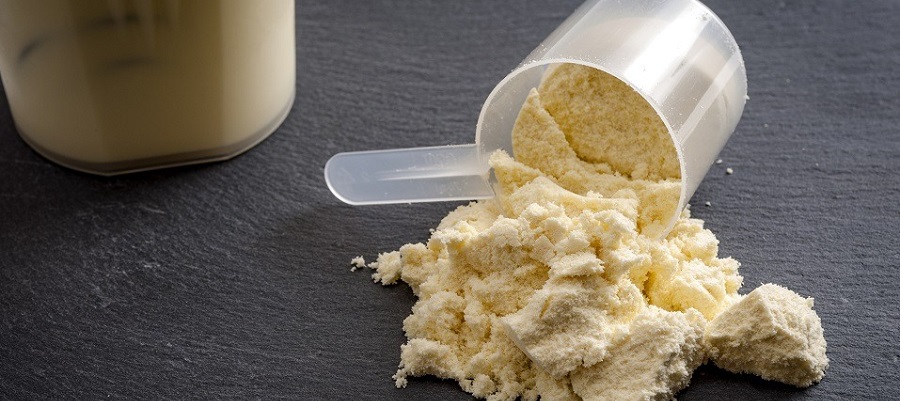Casein is a type of protein found in milk and dairy products. It is known for its ability to form a gel or clump together when mixed with liquids, which makes it useful in the food industry for things like making cheese and other dairy products.
One of the most notable characteristics of casein is that it is a slow-digesting protein. This means that it is absorbed by the body over a longer period of time than other types of protein such as whey. This can make it beneficial for muscle recovery and growth, as well as for helping to keep you feeling full and satisfied for longer periods of time.
Some of the potential benefits of consuming casein protein include:
- Supporting muscle growth and recovery
- Helping to control appetite and promote weight loss
- Improving bone health
- Lowering blood pressure
It is important to note that casein is not suitable for lactose intolerant individuals and may cause digestive discomfort for them.
It is also important to consider the environmental impact of casein production, as well as the ethical considerations related to the treatment of the animals from which it is derived.
Casein protein supplements are widely available in the form of powders, bars and other products, and can be used as a convenient and easy way to increase your protein intake. However, it is always recommended to consult with a healthcare professional before starting to use any supplement.
How is casein different from other milk proteins?
Casein is one of two main types of protein found in milk, the other being whey protein. One of the main differences between casein and whey protein is their rate of digestion. Casein is a slow-digesting protein, meaning it is absorbed by the body over a longer period of time than whey protein. This makes casein protein useful for muscle recovery and growth, as well as for helping to keep you feeling full and satisfied for longer periods of time.
Another difference between casein and whey protein is their chemical makeup. Casein is made up of 80-90% casein and 10-20% whey protein, while whey protein is made up of 80-90% whey protein and 10-20% casein. This means that casein protein supplements will contain more casein than whey protein supplements, and vice versa.
Another difference is that casein is less soluble in liquids than whey protein and tends to form clumps or a gel when mixed with liquids, which is why it is used in the food industry to make cheese and other dairy products.
It's also important to note that whey protein is a complete protein source with all the essential amino acids, while casein is not a complete protein source.
What are the benefits of consuming casein protein?
Some potential benefits of consuming casein protein include:
-
Supporting muscle growth and recovery: Casein protein is a slow-digesting protein, which means that it is absorbed by the body over a longer period of time than other types of protein. This can help to promote muscle growth and repair by providing a steady supply of amino acids to the muscles.
-
Helping to control appetite and promote weight loss: Casein protein can help to control appetite by keeping you feeling full and satisfied for longer periods of time. This can make it easier to stick to a calorie-controlled diet and lose weight.
-
Improving bone health: Casein protein is a good source of calcium, which is essential for maintaining strong bones.
-
Lowering blood pressure: Some studies have shown that consuming casein protein can help to lower blood pressure in people with hypertension.
-
Aiding in digestion: Casein protein can form a gel in the stomach which can slow down the digestion process, this can help to keep you feeling full for longer periods of time and can also aid in nutrient absorption.
It is important to note that more research is needed to fully understand the potential benefits of casein protein, and that individual results may vary. It is always recommended to consult with a healthcare professional before starting to use any supplement, and to make sure you are consuming a balanced diet and getting enough exercise.
How is casein protein used in the food industry?
Casein protein is used in a variety of ways in the food industry, due to its unique properties. Some of the most common uses of casein protein in the food industry include:
-
Cheese making: Casein protein is a key ingredient in the process of making cheese. When combined with rennet, casein coagulates and forms curds, which are then used to make cheese.
-
Baked goods: Casein protein is often added to baked goods as a binding agent, to improve texture and increase the protein content.
-
Meat products: Casein protein is sometimes used as a binder in meat products such as burgers, sausages and meatballs, to improve texture and increase protein content.
-
Dairy products: Casein protein is a key ingredient in many dairy products such as yogurt and cottage cheese, it helps to thicken the texture and provide a source of protein.
-
Sports nutrition: Casein protein is also used in sports nutrition as a supplement, it is often formulated in powders, bars or shakes and it is intended to help people meet their protein needs and improve muscle recovery after exercising.
-
Infant formula: Casein protein is also used in infant formula as an alternative to breastmilk, as it is easy to digest and is a good source of nutrition for infants.
-
Medical nutrition: Casein protein can be used in medical nutrition as a source of protein for people with certain health conditions that make it difficult for them to consume sufficient amounts of protein through diet alone.
It's important to note that casein protein can be used in many other food products and applications and that the food industry continues to innovate and find new ways to use casein protein.
What are the potential health risks associated with consuming casein?
As with any food or supplement, there are potential health risks associated with consuming casein. Some of the potential health risks to consider include:
-
Allergies: Some people may be allergic to casein protein, which can cause symptoms such as hives, itching, and difficulty breathing.
-
Lactose intolerance: Casein protein is a milk-derived protein, so it may cause digestive discomfort for people who are lactose intolerant.
-
Kidney damage: High levels of casein protein in the diet may put stress on the kidneys, which can lead to damage over time. This is particularly concerning for people with kidney disease.
-
Hormonal imbalances: Some studies suggest that consuming large amounts of casein protein may disrupt the balance of hormones in the body, particularly in women.
-
Animal welfare: The production of casein protein involves the use of animals, so the ethical considerations of animal welfare should be taken into account.
-
Environmental impact: Dairy production, including casein production, can have negative impact on the environment.
It's important to note that more research is needed to fully understand the potential health risks associated with consuming casein protein, and that individual results may vary. It is always recommended to consult with a healthcare professional before starting to use any supplement, and to make sure you are consuming a balanced diet and getting enough exercise.
How is casein protein processed and manufactured?
Casein protein is processed and manufactured through a series of steps:
-
Milk separation: Milk is first separated into cream and skim milk.
-
Pasteurization: The skim milk is then pasteurized to kill any bacteria and make it safe for consumption.
-
Separation of casein: The pasteurized skim milk is then subjected to a process called acid precipitation. This process involves adding an acid such as vinegar or lemon juice to the milk, which causes the casein to separate from the other proteins and form curds.
-
Filtration: The curds are then filtered to remove any remaining liquid, known as whey.
-
Drying: The filtered curds are then dried and ground into a powder.
-
Formulation and packaging: The casein powder is then formulated and packaged into various products such as powders, bars and other forms for human consumption or for industrial use.
It's important to note that there are different methods to produce casein protein and that the process can vary depending on the intended use and the final product. Also, some manufacturers may use chemical processes to separate casein from other proteins in the milk or to refine the casein protein powder further. It's important to always check the label and the ingredients of the casein protein products you consume and to consult with a healthcare professional before starting to use any supplement.
Can casein protein be consumed by individuals who are lactose intolerant?
Casein protein is a milk-derived protein, so it does contain lactose. Lactose intolerant individuals have difficulty digesting lactose, which is a sugar found in milk and dairy products. They may experience symptoms such as bloating, gas, and diarrhea when consuming products that contain lactose.
However, some casein protein products are specifically formulated to be low in lactose, and may be suitable for lactose intolerant individuals. These products are often labeled as "lactose-free" or "low-lactose." It's important to check the label and the ingredients of the casein protein products you consume.
Additionally, some people who are lactose intolerant may be able to tolerate small amounts of lactose without experiencing symptoms, so it is possible for some lactose intolerant individuals to consume casein protein in small amounts, but it's always best to consult with a healthcare professional before starting to use any supplement.
Another option to consider is using casein protein alternatives that are not derived from milk, such as pea protein, soy protein, or rice protein, which are suitable for lactose intolerant individuals and vegans.


